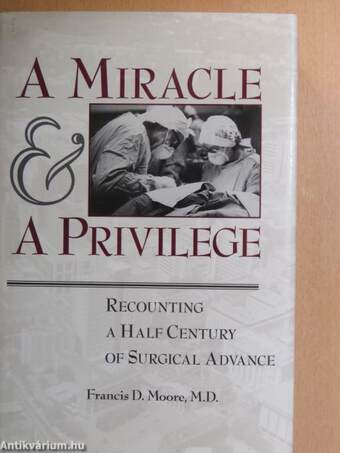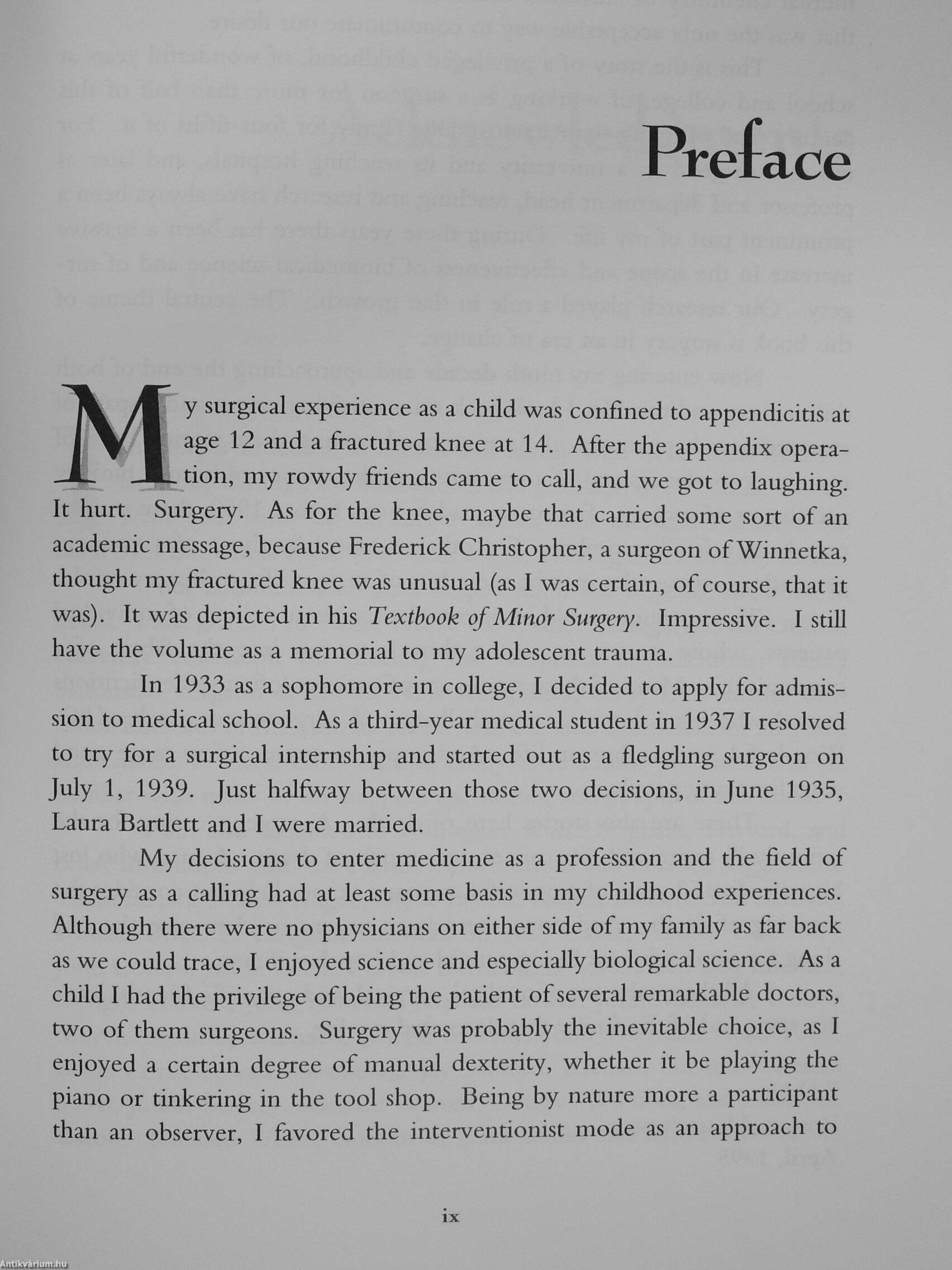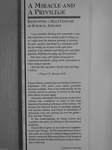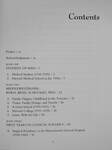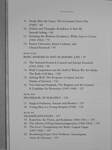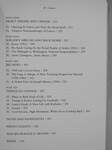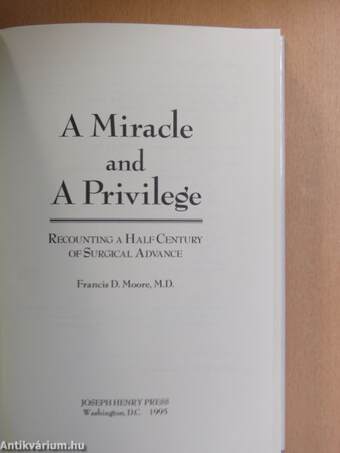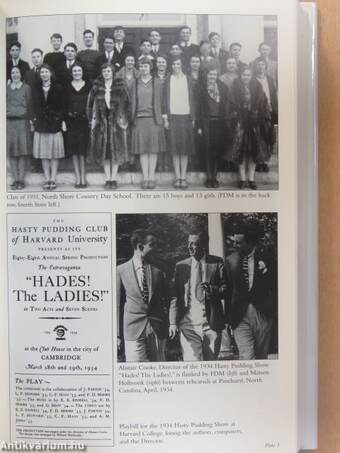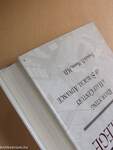1.116.679
kiadvánnyal nyújtjuk Magyarország legnagyobb antikvár könyv-kínálatát
A Miracle And A Privilege
Recounting a Half Century of Surgical Advance
| Kiadó: | Joseph Henry Press |
|---|---|
| Kiadás helye: | Washington, D.C. |
| Kiadás éve: | |
| Kötés típusa: | Vászon |
| Oldalszám: | 450 oldal |
| Sorozatcím: | |
| Kötetszám: | |
| Nyelv: | Angol |
| Méret: | 24 cm x 16 cm |
| ISBN: | 0-309-05188-6 |
| Megjegyzés: | Fekete-fehér fotókkal. |
naponta értesítjük a beérkező friss
kiadványokról
naponta értesítjük a beérkező friss
kiadványokról
Előszó
TovábbFülszöveg
A Miracle and A Privilege
Recounting a Half Century of Surgical Advance
"I can remember thinking how remarkable it was that institutions in our society could set things up so I might have the immense privilege of relieving the pain, anguish, and threat to a wonderful small boy by making an incision in the right lower quadrant of his abdomen and taking out a pus-filled appendix skillfully and safely; my first operation.
Now here I was, with skilled nurses and an experienced anesthetist, shiny sterile instruments at hand, ready to operate.
I felt that this was both a miracle and a privilege. I still do."
—Francis D. Moore, M.D.
Francis Moore entered Harvard Medical School in September 1935, seven years before penicillin became available. Now in his ninth decade, he has recently served as advisor to NASA on the long-term effects of space flight.
Along his remarkable life's journey, he has been witness and contributor to some of the most important biomedical advances of the... Tovább
Fülszöveg
A Miracle and A Privilege
Recounting a Half Century of Surgical Advance
"I can remember thinking how remarkable it was that institutions in our society could set things up so I might have the immense privilege of relieving the pain, anguish, and threat to a wonderful small boy by making an incision in the right lower quadrant of his abdomen and taking out a pus-filled appendix skillfully and safely; my first operation.
Now here I was, with skilled nurses and an experienced anesthetist, shiny sterile instruments at hand, ready to operate.
I felt that this was both a miracle and a privilege. I still do."
—Francis D. Moore, M.D.
Francis Moore entered Harvard Medical School in September 1935, seven years before penicillin became available. Now in his ninth decade, he has recently served as advisor to NASA on the long-term effects of space flight.
Along his remarkable life's journey, he has been witness and contributor to some of the most important biomedical advances of the century. He became the beloved doctor to countless patients, and teacher, mentor, and friend to thousands of physicians who now practice all over the globe— they call him "Franny."
In this autobiography, he brings humor and warmth to the story of a lifetime at the forefront of medicine.
Francis Moore grew up in a well-to-do neighborhood near Chicago. But his most profound memories center on caring for underprivileged patients in charity wards and delivering babies in the homes of Boston's poorest families during his medical education at Harvard.
(Continued on back flap)
© 1975 Karsh, Ottawa
Francis D. Moore, M.D., is Moseley Professor of Surgery Emeritus, Harvard Medical School, and Surgeon-in-Chief Emeritus, Peter Bent Brigham Hospital.
(Continued from front flap)
Moore and his staff at Harvard were best known for their instrumental work in metabolic care and organ transplantation, marked by Moore's appearance on the cover of TIME in the early sixties.
He pioneered the technique of using radioactive isotopes to locate abscesses and tumors. Moore conceived a breakthrough nuclear technique for body measurement Archimedes-like—in the bathtub, acquiring deuterium directly from its discoverer, Harold Urey. His 1959 book Metabolic Care of the Surgical Patient was one of the most widely quoted volumes in the surgical literature of the day.
With authority and wit, Moore recounts fascinating details both of the victories and the setbacks of colleagues making Nobel prize-winning discoveries, and tells compelling tales of his patients— including the poverty stricken mother who gave Moore a silver dollar for delivering her baby.
Moore reflects on ethics "at both ends of life" with frank comments about abortion and the physician's role at the end of life. He discusses research ethics, the consequences of medical errors, and many other issues driving the health care debate.
In A Miracle and a Privilege, we are treated to a wide-ranging mind, honed by the experiences of a diverse career and a compassionate heart. Throughout, Moore's theme is the inward healing powers, inseparable mental and physical processes in us all. Vissza
Témakörök
- Idegennyelv > Idegennyelvű könyvek > Angol > Szépirodalom > Regény, novella, elbeszélés
- Idegennyelv > Idegennyelvű könyvek > Angol > Orvostudomány
- Szépirodalom > Regény, novella, elbeszélés > Az író származása szerint > Amerika > Amerikai Egyesült Államok
- Szépirodalom > Regény, novella, elbeszélés > Tartalom szerint > Orvosregények
- Orvostudomány > Általános orvosi, egyéb > Híres orvosok
- Orvostudomány > Általános orvosi, egyéb > Idegennyelvű
- Orvostudomány > Orvosi idegennyelvű könyvek > Általános orvosi
- Orvostudomány > Orvosi idegennyelvű könyvek > Sebészet
- Orvostudomány > Sebészet > Egyéb sebészet
- Orvostudomány > Sebészet > Idegennyelvű
- Szépirodalom > Regény, novella, elbeszélés > Tartalom szerint > Életrajzi regények > Önéletrajzok, naplók, memoárok


